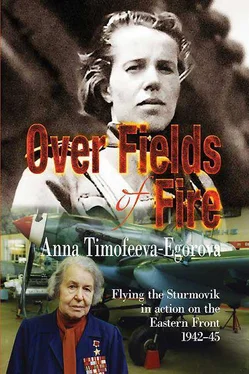And here we were — my plane was refuelled, bombs and rockets fixed, cannon and machine-guns charged. I saw a flare soar into the air and again I hastily climbed into the cockpit, wiping my tear-stained face on the run… This time our leader was Petr Timofeevich Karev — a Moscovite from Zamoskvorechie 117 117 Translator’s note — a suburb of Moscow.
. I liked flying with him: from my point of view there was no better leader in our regiment. It was somehow uncomplicated flying with him: he would tell a joke, then drop a catchphrase — and all that right before an attack! Look, we’ve done three or four passes on a target and haven’t noticed the pressure! More than once fate forgave him his bold and openly reckless escapades in the air…
I remember Karev once, having drunk up to 300 grams of vodka at dinner (that day he had made three sorties, and 100 grams were allowed after each sortie), leaving to tell the flak gunners defending our aerodrome what was what. “My old pals, you send far too many shells into the blue sky when the bast shoe-bearers appear” 118 118 Editor’s note — a nickname for German Junkers Ju 87 dive-bombers in Russian military slang.
, Karev said. “I’ll take off in my Il now and you shoot at me. I’ll be shooting at you. Let’s see who gets who!”
Of course, Karev failed to bring off that experiment but all the pilots — witnesses to that argument — were as confident of Karev as of themselves: of his infallibility and invulnerability. Everybody in the regiment loved him for his straightforwardness and approachability. He was always together with his comrades, lived their joy and problems, and during a hard moment he was more capable than anyone in his ability to raise spirits. The captain didn’t disdain rough work, and one could often see him shoulder a bomb that was a bit heavy and quickly carry it to the plane. The young girls from the armoury worshipped such a voluntary helper and would vie with each other in offering to wash his clothes and handkerchiefs… Petr would decline, thank them and sing in reply: “How many sweet girls, how many tender names…”
Pilots, mechanics, technicians, aerial gunners would always gather round Karev in a tight circle, and then a confidential discourse would begin, usually ending in a burst of laughter — this would be Petr telling his ‘abracadabra’, as he liked to call his anecdotes.
Karev could be sent on the most complicated flight with confidence that he would carry out his mission completely. He fought bravely and boldly. Scornful of death, he would fly to a target through a wall of fire of Fascist flak and attacks by enemy fighter planes. During debriefing the regimental navigator set various tactical tasks before the pilots. All together we analysed how to attack a train or a tank column most successfully, or to bomb a bridge or river crossing, and why it would be better to approach such narrow elongated targets not perfectly parallel to the course but at a narrow angle. We talked about speed, wind direction near the ground and at intermediate altitudes, taking into account how in that case the dissipation ellipse would look when bombing or shooting. Karev’s idea to manoeuvre inside a group of Sturmoviks became a common practice in the regiment. Initially, the pilots had been required to stick strictly to their positions in a formation. But Karev had got the tactics changed and required pilots to manoeuvre within certain limits: to fly above or below the leader, to change the distance between planes… All this improved alertness, impeded attacks by Fascist fighters and hindered their ack-ack from directing accurate fire at the Sturmoviks .
At Taman Karev was the idol of the young pilots. We all remembered Petr Timofeevich when he was Acting Regimental Commander, finding at a very difficult moment a courageous, clever and expert solution to a problem. During one sortie a bomb tore away from its clamps and exploded during a plane’s take-off run. The surviving pilot and gunner managed to run aside and lie down but there still were five 100-kilogram bombs on the plane. The group’s take-off was stopped then, but the combat mission couldn’t be cut off! Karev ordered the start realigned by about thirty degrees. The planes began to take off again. Despite the realignment of the start the departing planes were passing close the burning machine on which there were still bombs, ammunition and rockets. Everyone could probably expect an explosion, but the plane blew up when the last Il-2, flown by Karev, was already in the air.
But from that sortie made by a sixer, when a bomb exploded on one of the Ils during the take-off, only two crews returned — Karev’s and mine — his wingman’s. We had found the target and dropped our bombs, then strafed everything in three or four passes, and retired with not a single loss. Although battered we got away. But we shot over a German aerodrome, and it was full of German planes — they were landing and taking off. Flak guns held us as if in a ring! We were over the Kerch Straits when somehow we broke out of that ring, but only Karev and I: all the other crews perished over the German aerodrome. I didn’t even see who smashed them — either the planes taking off, or the flak. Now we had broken out into the Kerch Straits, and we had to go to the other side. Down below us white domes, the parachutes of our comrades, shot-down airmen, hung in the air like giant mushrooms… I still had two bombs unreleased, but behind us there were Messsers ready to make short work of our pair. Suddenly I noticed a loaded barge right underneath me, moving from Kerch — the temptation was great. I wasn’t supposed to land with bombs, but I would have been told off had I dropped them just anywhere. So I fell behind Karev a little, turned the Sturmovik towards the target and jerked the lever of the emergency bombload release. I wobbled in the air a bit, the plane shook, wavered and became uncontrollable for a while — yet I kept watching the barge: how was it feeling down there? I hadn’t missed: the barge listed and went down. But suddenly doubts pricked me like a pin: whose barge had it been — ours or the Germans’?.. I’d seen no markings on it. I had been moving away from Kerch busy with the enemy and besides, our men would have spread out canvas as a distinguishing mark, but this time I’d seen nothing. But you never can tell! That was why I decided to say nothing about it, and when reporting to the regiment commander on the sortie said not a word about the sunken barge…
The secret, however, had already been disclosed: prior to the landing my leader and our fighters had reported by radio the destruction of a vessel recognised by them as German, and Karev added “Egorova sank a barge full of materiel, there were tanks on it”. And soon the Division Commander General Get’man pinned to my blouse a large silver medal ‘For Valour’.
At the end of May 1943 the Regimental Commander Kozin lined up all the flying personnel at the aerodrome and said with emotion: “Comrade Pilots! Whoever is ready to carry out a special mission from the North-Caucasus Front Command — I ask you to step out forward.”
All the pilots stepped forward as one.
“No, that won’t work!” Kozin smiled. “I’ll have to pick. Major Kerov — three steps forward.” Pavel Kerov, the 1st Squadron commander, veteran of the regiment, master of ground attack, stepped forward…
We youngsters had always marvelled at the major’s enviable calmness and kindness. He was more like a schoolteacher than a fearless ground attack expert. He had never raised his voice at anyone, and if anyone was at fault Kerov would look at him with sad grey glazed eyes, shake his head and walk away, rolling like a sailor, leaving his subordinate to think over his behaviour.
Читать дальше












